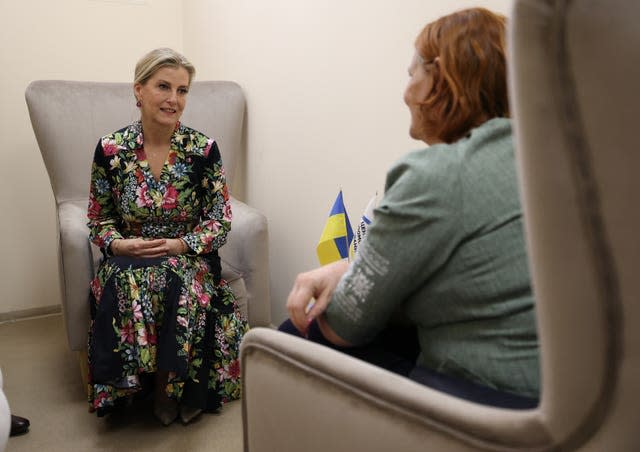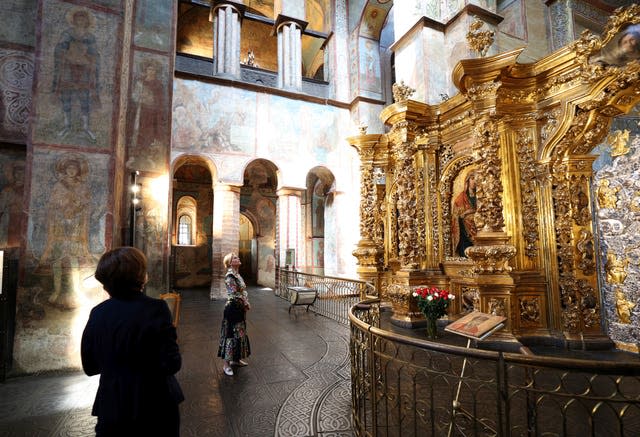Sophie becomes first royal to visit Ukraine since start of Russian invasion

The Duchess of Edinburgh has become the first member of the royal family to visit Ukraine since the start of the Russian invasion.
Sophie met the president and first lady of Ukraine, Volodymyr Zelensky and Olena Zelenska, on Monday morning and delivered a message to them on behalf of the King.
They discussed how to support survivors of conflict-related sexual violence and the women peacebuilders who have a part to play in ensuring Ukraine’s recovery and reconstruction is effective and long-lasting, the Foreign, Commonwealth and Development Office (FCDO) said.
The duchess visited Ukraine at the request of the FCDO to demonstrate solidarity with the women, men and children impacted by the war and in a continuation of her work to champion survivors of conflict-related sexual violence.
Sophie met survivors of conflict-related sexual violence and torture who shared their stories, and talked to children who have been returned to Ukraine after being forcibly separated from their families and deported by Russia as part of a sustained campaign to erase Ukrainian culture, the FCDO said.
During the visit, Sophie paid her respects to those who died in Bucha, two years on from its liberation from Russian forces, and visited the “Road to Life”, a bridge which became a key part of the Ukrainian resistance when it was blown up to stop Russian troops proceeding to Kyiv, and later became a vital route for people to flee to safety from the Russian occupation.
The duchess also demonstrated her support for Ukrainian women who have played important roles in the conflict and community recovery, in a meeting with volunteers who help their communities cope with the aftermath of attacks with mental health care activities for children.
Speaking at an evening reception at the residence of the UK ambassador to Ukraine, Martin Harris, Sophie said she had travelled to many countries in conflict or post-conflict, and “women and girls pay the highest price in terms of human costs”.
She said: “Rape is used to demean, to degrade and to destroy. And we have to get better at trying to prevent that from happening. Where we cannot prevent it from happening. What we must do is put measures in place to support those who have fallen victim to such crimes.”
The duchess said she has met survivors of sexual violence and thanked them for their “openness”.
She said: “I thank them for that honesty in telling me what happened to them.

“Their stories are sad. I hear many stories like this, sadly, from around the world. But I appreciate their time and their openness.”
The duchess added that she had met people who “played a large role in Bucha and Irpin” to help their communities, and she will “take those stories home in my heart”.
During a video address at a conference on conflict-related sexual violence in Ukraine last month, the duchess said: “Survivors here and around the world have spoken out so bravely about their experiences.
“They are the most powerful advocates who remind us all that we must not turn our backs on the horrors of this crime, we must never forget survivors.

“Rather, we must stand shoulder to shoulder with all survivors to secure justice and holistic redress, and ensure that this crime isn’t an accepted part of conflict.
“Their rights and their voices must be at the heart of all our efforts to consign conflict-related sexual violence to the history books.”
Sophie announced her commitment to champion the UK’s Preventing Sexual Violence in Conflict Initiative (PSVI) and the UN’s Women, Peace and Security Agenda (WPS) on International Women’s Day in 2019.
She has visited a number of countries over the years to highlight the impact of historical and ongoing conflict, including Kosovo, Sierra Leone, South Sudan, the Democratic Republic of the Congo and Colombia.


